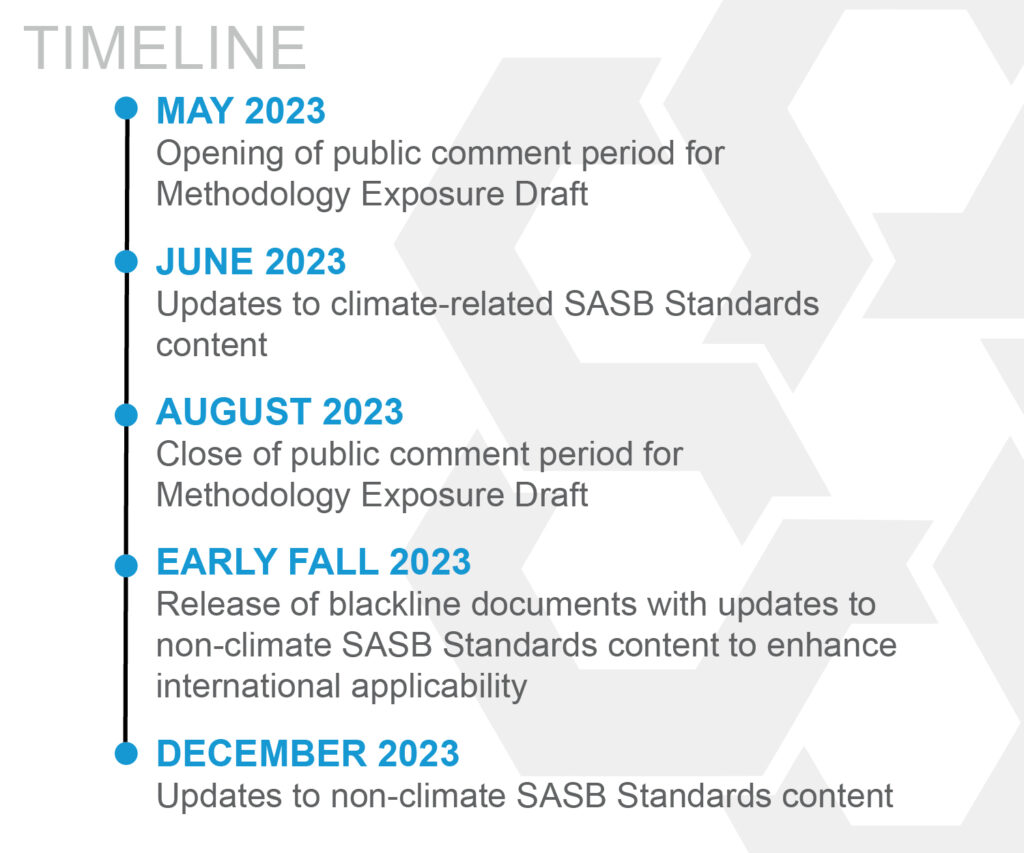ISSB updates to SASB Standards
The SASB Standards are a source of guidance for applying IFRS S1 General Requirements for Disclosure of Sustainability-related Financial Information. Industry-specific disclosures are required as part of the ISSB’s Standards and, in the absence of specific ISSB Standards, companies must refer to and consider the SASB Standards to identify sustainability-related risks, opportunities and related metrics. Accordingly, the ISSB has committed to maintain, enhance and evolve the SASB Standards and encourages preparers and investors to continue to use them.
In December 2023, the ISSB completed an initial phase of amendments to the SASB Standards to enhance international applicability. The following timeline describes milestones for the project.

Milestones
June 2023
Updates to climate-related SASB Standards content
- Context
- IFRS S2 includes industry-based guidance derived from climate-related SASB Standards content.
- With issuance of IFRS S2, ISSB released updated SASB Standards to align them with S2.
- Details
- New topics and metrics covering financed emissions in 3 industries: Asset Management & Custody Activities, Commercial Banks, and Insurance
- Revisions to 12 metrics to enhance international applicability
- Removal of 6 metrics that are not internationally applicable
- Related content
- Download the Staff Paper prepared for May ISSB meeting listing metrics in question.
August 2023
Close of public comment period for international applicability Methodology Exposure Draft
- Context
- When applying IFRS S1, preparers are required to refer to and consider applicability of SASB Standards in identifying and disclosing information regarding sustainability-related risks and opportunities.
- ISSB is enhancing international applicability of the SASB Standards to ensure companies can use them to prepare disclosure under S1, regardless of location.
- From May to August 2023, the ISSB held a public consultation on its proposed approach to enhancing the international applicability of SASB metrics covering all topics beyond climate (climate-related metrics were updated alongside publication of IFRS S2 in June).
- Details
- Proposed methodology involves removal and replacement of references to specific jurisdictions without significantly altering industries, topics or intent of current metrics.
- Consultation gave stakeholders opportunity to voice their views on ISSB’s proposed methodology and provide input on possible future enhancements to SASB Standards.
- Related content
- Visit the IFRS Foundation page about the Methodology Exposure Draft consultation.
- Download a PDF of the Exposure Draft: Methodology for Enhancing the International Applicability of SASB Standards and SASB Standards Taxonomy Updates.
- View summary of feedback from public comment period presented to the ISSB on 14 September.
October 2023
Release of blackline documents with updates to non-climate SASB Standards content
- Context
- The ISSB analysed feedback on the Methodology Exposure Draft and developed revisions to the SASB Standards informed by that feedback.
- Details
- Prior to issuing updated SASB Standards, blackline documents detailing revisions to SASB Standards were published to allow stakeholders to familiarise themselves with the revisions.
- Related content
- View the blackline documents.
December 2023
Updates to non-climate SASB Standards content
- Context
- After public review of proposed revisions and incorporation of stakeholder feedback, the ISSB published amendments to the SASB Standards to facilitate IFRS S1 application.
- Details
- Issuance of these updates marks ISSB’s completion of initial phase of updates to the SASB Standards to improve the ease of application of the SASB Standards and IFRS S1.
- About 200 metrics were revised to enhance international applicability, increasing comparability and reducing application costs without altering intent or underlying concepts.
- Entities already using the SASB Standards can, in most cases, continue to provide the same disclosures irrespective of these amendments.
- Related content
- Download the updated SASB Standards.
- Visit the IFRS Foundation page about the International Applicability of SASB Standards project.
- Subscribe to ISSB news alerts and stay tuned for further communication about related content and resources.
